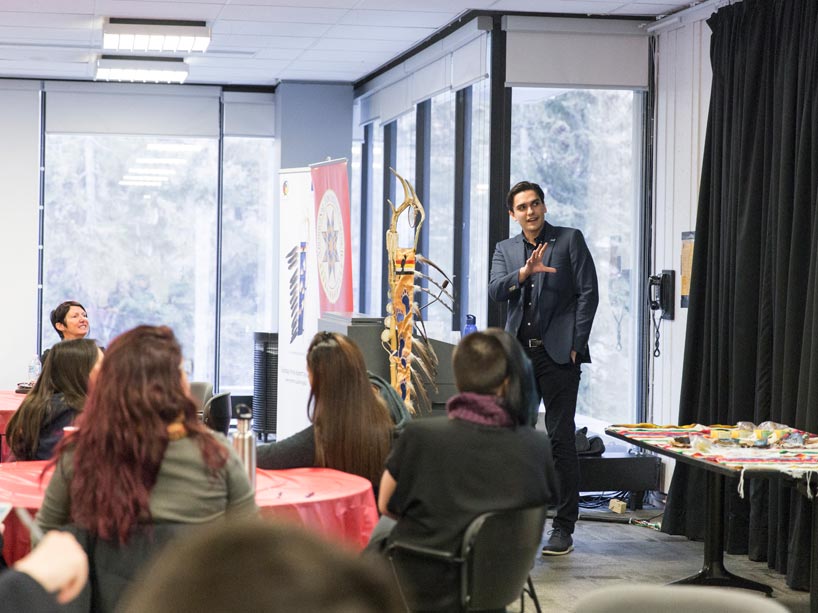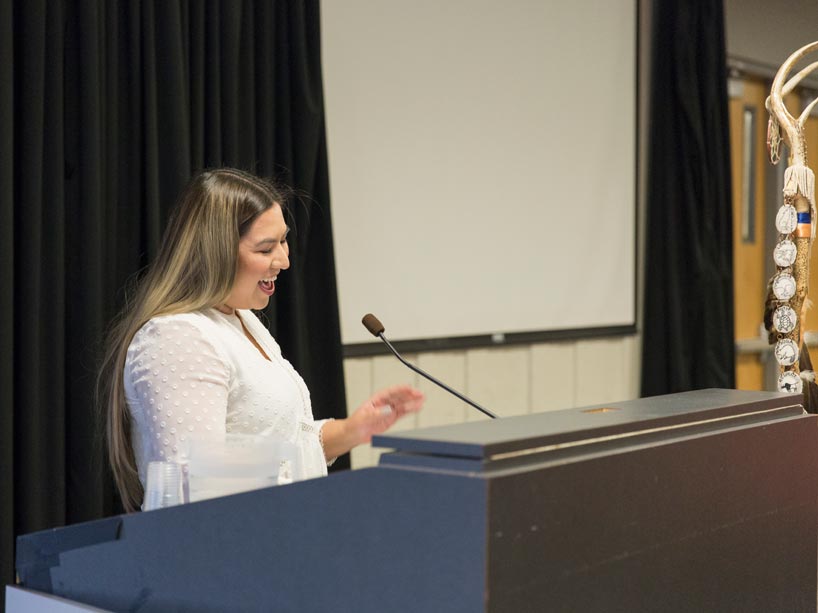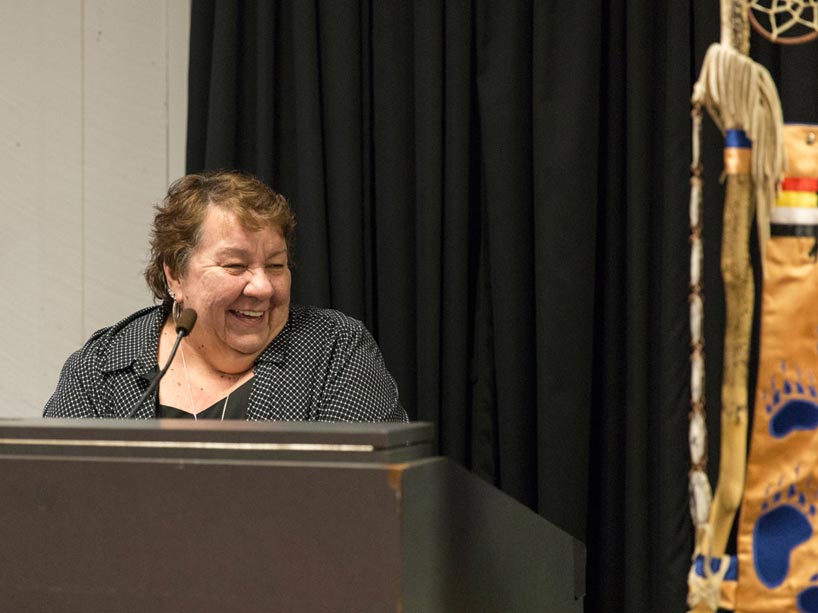Indigenizing academia
Photos: Indigenous students Riley Kucheran and Amanda Quinn discussed their work, and campus Elder Joanne Dallaire led a prayer, at the Aboriginal Education Council’s Annual General Meeting and Student Showcase on March 13. Photos by Alia Youssef.
On March 13, the Aboriginal Education Council (AEC) held its Annual General Meeting (AGM) and Aboriginal Student Showcase, highlighting the Indigenous knowledge in Ryerson’s curriculum and the accomplishments of Ryerson’s Indigenous students.
The Aboriginal Education Council provides education and guidance to Ryerson about the history and legacy of colonization, how education is experienced by Indigenous Peoples, and what learners’ needs are. It also works to develop an infusion model of Aboriginal content and curriculum across all university programs.
In her presentation, social work professor and AEC chair Cyndy Baskin provided a rundown of the achievements of the AEC and Ryerson’s Indigenous community more broadly. The AEC has helped infuse Indigenous knowledge in programs ranging from criminology to image arts, journalism, nutrition and sociology, and has supported the Library, Student Affairs, the Learning and Teaching Office, and more. The AEC also provides funding for professional development programs; facilitated guest-speakers, workshops, and blanket exercises; and encouraged the hiring of staff. Most programs have hired Aboriginal people (as student research assistants, instructors, consultants, and/or professors), and Baskin also noted that Ryerson has Indigenous students in every academic program at the university—underlining the importance for the infusion model.
“Indigenous students want Indigenous content in their discipline,” said Baskin. “They want their degree in nursing or engineering or whatever it might be, and to have Aboriginal-focused content, faculty, etcetera. They’re not so interested—and never have been—in an Indigenous studies program, because they say they can get that elsewhere, which they can.”
Considering Truth and Reconciliation, Baskin noted, “We all need to remember that ‘truth’ is the first word in the Truth and Reconciliation process. It is really critical for all Canadians to know that truth before they are in any position to reconcile with us. I would also like to remind everyone that reconciliation is not something that Aboriginal Peoples at Ryerson should be expected to shoulder.”
In January, Ryerson announced its response to Ryerson’s response to the 2015 Truth and Reconciliation Commission of Canada (TRC). Ryerson Provost and Vice-President, Academic Michael Benarroch spoke about the steps that Ryerson is taking to implement the recommendations from the community consultation, including establishing a committee (the TRC Working Group) with representatives from all faculties to discuss; allocating money for hiring Indigenous faculty and staff; and launching discussions about Indigenous spaces on campus.
“There’s so much more we can do to attract Indigenous students to Ryerson University,” said Benarroch. “I think some of those things challenge our convention of how we see ourselves as a university, and the so-called standards that we’ve put in place.
“Cindy talked about alternative ways of bringing faculty to the university. As we sit here right now, we are having the challenge of a faculty member that a department wants to hire that doesn’t fit into the box that we’ve created. We need to figure out how to break that box and move forward, and accept that there will be differences.”
Benarroch added, “I’m always struck by something that Murray Sinclair once said to me: ‘If you continue to do things the same way, you will continue to have the same outcomes.’ … That couldn’t be truer for Ryerson University. We can’t continue to do things the same way.”
Following the AGM, the Aboriginal Student Showcase highlighted the achievements of two distinguished Aboriginal students. Communication and culture PhD candidate Riley Kucheran delivered a presentation on his Indigenizing Fashion research, which examines how clothing was used as a tool of colonial oppression, and showcases how modern designers are reclaiming Indigenous aesthetics.
“The skills learned from residential schools are now used to stitch together a counter-narrative,” said Kucheran. “These sewing skills were passed on from grandmothers and aunties to their children, and now we have Indigenous designers using those skills to tell their own stories.”
With support from the AEC, Kucheran travelled to Dechinta, an educational centre in a remote area of Yellowknife that specializes in traditional knowledge and values. “It was learning in an intergenerational community. Kids and elders were there, and there wasn’t a divide between who was in the school and who was not, and we learned so much from the kids.”
The trip intensified his interest in land-based education: “We have this concept of being on the land and in urban places. I don’t think they have to be binary—we can take land-based practices here. We’re on land right now, we just don’t often think about it because it’s buried under concrete.”
RTA media production student Amanda Quinn discussed the Toronto Cree Association, a group she started in September 2016. The group grew from Quinn’s own feelings of isolation after moving far from the community where she grew up to attend university.
Speaking to the culture shock and loneliness often felt by Cree students moving away from home, Quinn said, “I believe there’s power in community: it builds confidence, creates a sense of belonging and friendships. People can go so far alone, but together, people can go much further.” Quinn also spoke of plans to open the association to other Indigenous students in Toronto.
Monica McKay, director of Aboriginal Initiatives at Ryerson, recalled her upbringing in the small British Columbia community of Laxgalts’ap. “I never forget how difficult it is to be away, and the importance of upholding the relational model that I think each of us knows is so important to how we move in this world. When I look out, I have a full heart to see our Aboriginal learners, with people that work here and with community members.”
Following a presentation of the AEC’s awards, campus Elder Joanne Dallaire delivered an emotional closing note: “It’s our ancestors who worked so hard, and I know I don’t have the right to be proud of all you, but I am. … The students who received awards, hold your heads up high and be very proud of yourselves.”
For more information about the Aboriginal Education Council, visit https://www.torontomu.ca/aec/. To learn more about Indigenous news at Ryerson, please visit https://www.torontomu.ca/aboriginal-news/.


